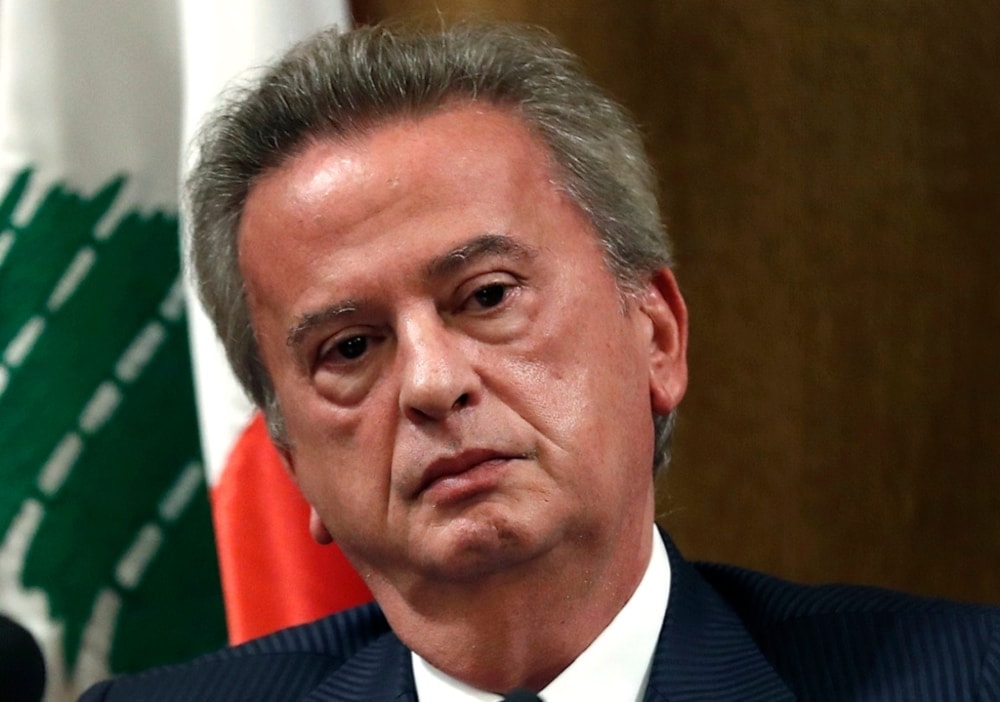Lebanon's ex-central bank chief stays behind bars as probe continues
The charges against Salameh include embezzlement, forgery, and illicit enrichment.
-

Former central bank governor Riad Salameh listened to a journalist’s question during a press conference in Beirut on November 11, 2019. (AP)
A judge has ruled that Lebanon's former central bank chief, Riad Salameh, must remain in detention as an investigation into alleged financial crimes continues.
Investigative Judge Bilal Halawi made this decision following Salameh's first interrogation since his arrest last week, according to three judicial sources. State media reported that the charges against Salameh include embezzlement of public funds, encompassing forgery and illicit enrichment.
Judge Halawi has scheduled another hearing for Thursday, according to one source. Salameh's media office has stated that he will refrain from commenting publicly on the case, as required by law. They noted that Salameh had previously cooperated with over 20 criminal investigations in Beirut and Mount Lebanon.
Should the prosecution proceed, it would represent a rare instance of a high-ranking Lebanese official, either current or retired, being held accountable—a notable development in a system often criticized for protecting the elite.
The charges filed against Salameh last week are distinct from earlier allegations of financial misconduct involving Forry Associates, a company managed by his brother, Raja. The Salameh brothers, who deny any illegal activity, were previously accused of funneling $330 million in public funds through commissions using Forry.
Dive deeper
Lebanese authorities took the unprecedented step last Tuesday of arresting Salameh after questioning him over alleged embezzlement.
According to a judicial source, who requested anonymity due to a lack of authorization to speak to the media, Lebanon's public prosecutor ordered Salameh’s arrest following three hours of questioning "on suspicions of embezzlement from the central bank exceeding $40 million," with the funds allegedly transferred abroad.
This marked the first time Salameh has appeared before Lebanon’s judiciary since stepping down from his 30-year tenure at the end of July last year without a successor. He is widely regarded as a key figure in Lebanon's severe economic collapse, which began in late 2019.
At the time, he arrived at the judge's office "without a lawyer" and chose to waive his right to have a lawyer present when asked, according to the source.
The questioning pertained to a case entirely separate from other ongoing investigations, the source added, noting that Salameh’s responses were deemed unconvincing by the judge, who subsequently ordered his arrest.
Salameh also wanted in France
Salameh has since been transferred to a detention facility in Beirut's Ashrafieh area, where he may be held for up to four days unless formally charged.
The former central bank governor is also wanted by French authorities for alleged financial crimes, with Interpol having issued Red Notices against him. However, Lebanon does not extradite its citizens.
Lebanese authorities have frozen Salameh’s bank accounts, while the United Kingdom, Canada, and the United States have imposed sanctions on the former official.
In June, a German court revoked an arrest warrant against Salameh, citing that he no longer held a position that could suppress evidence. Nevertheless, the court maintained that the suspicion regarding the allegations against him remained "urgent".
In March 2022, authorities in France, Germany, and Luxembourg seized assets worth €120 million ($130 million) as part of an investigation into Salameh’s wealth. European investigators have questioned Salameh in Beirut, as well as other individuals, including his assistant Marianne Hoayek, his brother Raja, a Lebanese minister, and central bank audit firms.
Following the issuance of the Interpol Red Notices, a local judge questioned Salameh, confiscated his French and Lebanese passports, imposed a travel ban on him, and released him pending further investigations.
Since late 2019, Lebanon has been engulfed in an economic crisis, described by the World Bank as one of the worst in modern times, plunging many into poverty.
Read more: Lebanon's Salameh world's worst central banker: The Economist

 4 Min Read
4 Min Read










